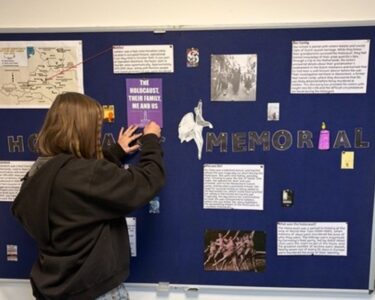We are delighted to announce our 22nd Quality Mark Beacon School: Oakmoor School. Our Quality Mark review process confirms the schools’ quality provision for and evolving specialism in Holocaust education. Holocaust teaching and learning (and its first steps towards genocide education, prevention, and human rights awareness) is contributing to a curriculum that informs, engages and enriches: resulting in outcomes that are empathetic and insightful, where students have been inspired and empowered by their learning experiences.
Oakmoor School is an 11-16, mixed gender, non-selective secondary school in Hampshire.
The UCL Centre for Holocaust Education extend our warmest congratulations to Headteacher, Mr Paul Hemmings, and the whole school community on this prestigious achievement, and take the opportunity to outline 6 key strengths that should be celebrated and shared as best practice.
The Quality Mark identifies and celebrates many examples of best practice and innovation at Oakmoor School and recognises areas for ongoing development and internal reflection, but we highlight here, by way of summary, 6 key strengths following a highly successful, positive and enjoyable review process:
- ‘Curriculum connectives’ – the work to map, encourage and understand disciplinary contributions provides the centrepiece of Oakmoor’s current strength in Holocaust education. It is a skilful and significant piece of curriculum planning work, speaking to a quality curriculum design and intent, that aligns to the notion Beacon School status resides with the school, and a growing sense of ‘collective endeavour’, in recognition of Holocaust Education’s potential role and contribution in addressing school priorities and supporting overall improvement.
- The quality of Holocaust teaching and learning, and the outcomes for Oakmoor students, particularly, but not exclusively, within History, is strong. UCL research, classroom principles and materials are evident within its provision: preparation, pedagogy and practice. Significant thought, time and careful planning has gone into a rich Holocaust offer that sits within the Humanities year 8 curriculum and taught cross the summer term.
- Oakmoor’s ‘The Holocaust’ scheme of learning is informed by the UCL Centre for Holocaust Education pedagogy and educational principles: humanising the history, respect for victims, foregrounding testimony, no/limited use of atrocity images, challenging misconceptions by open research (various UCL teacher/student studies) and a focus on good historical skills and concepts such as inference, interpretation, and chronology. Personal stories are a strong feature of Oakmoor’s Holocaust scheme of learning, and students found trips and enrichment opportunities such as to the Jewish Museum or IWM London, particularly compelling.
- Oakmoor School’s developmental journey continues to be built upon a constant pursuit for research informed, quality and impactful teaching and learning. The lessons observed for the purposes of review bore a variety of hallmarks of quality ‘teaching’, rather than specifics of quality teaching about the Holocaust. Across lessons based on UCL materials, British responses to the Holocaust (Why didn’t we help? Lesson 6) and Striving to Live/resistance (Why didn’t they fight back? Lesson 7), a variety of teacher talk approaches, quality questioning, opportunities for reflection and a range of literacy strategies and UCL pedagogical principles demonstrated confidently. Students were, for the most part, attentive, actively engaged and their responses spoke to a range of secure prior learning.
- The regard for and level of access to, continued professional development is outstanding. The Lead Teacher, with SLT link support, has fought hard to secure a range of opportunities to lead, develop and support staff in the delivery of Holocaust related curriculum and learning. That investment in continued professional development speaks to the leadership and a recognition the school cannot meet its bold and brave curriculum intent (curriculum connectives) and aspiration/expectation for quality outcomes for learners (its Holocaust teaching and learning), without investing in its people, formally and informally.
- The students Holocaust scheme of learning booklet – content aside, evidently rooted in UCL materials (though significantly adapted for accessibility reasons) and a focus on UCL research informed key themes– revealed itself to be a strength for unexpected reasons! The student’s booklets are specially sent home to parents at end of the unit – unlike any other booklet, scheme of student work at the school. It is a deliberate invitation to invite/encourage conversation and shared learning at home. Within the student voice panel, this was talked about with a great source of pride. Anecdotes from home learning conversations were shared, and it was a reference point for their reflections on their learning journey: the impact of this booklet, and the small but usual step to arrange for their being sent home, should not be under-estimated.
In addition to these strengths and those which will be cited in the full report, we would like to take this opportunity to recognise Lead Teacher, Anne Sutehall.
Of Anne, mentor Dr Andy Pearce said:
“Anne was an absolute pleasure to work with on the Beacon School Programme. Her dedication to developing professionally and to enhancing the provision of Holocaust education in her school was always first-class, and her willingness to think creatively and go above and beyond is illustrated by the progress that has been made at Oakmoor in recent years. Anne’s desire to make learning about the Holocaust more than just a classroom topic was aptly illustrated by the extracurricular activities she has initiated and by her determination to support her colleagues in their own professional development journey. From an early stage she made no secret of her ambition to achieve Quality Mark status and that she has now done so, is testament to her hard work.”
Whilst Anne has led and driven the schools’ Beacon work – the success of the programme and it’s impact upon student knowledge, understanding, experience and outcomes, is thanks to a dedicated humanities team – whom she is rightly hugely proud of, so it was entirely appropriate upon a successful Beacon School review a delighted Lead Teacher was full of praise for #TeamOakmoor:
“We are delighted to have been recognised by UCL for our work on Holocaust Education. The Humanities department and colleagues across the school have worked together to ensure that the students get a thorough understanding of the outcomes of hate and prejudice. I would also like to recognise the continued support of Dr Andy Pearce, who started us on this journey as our Beacon School mentor as well as Dr Nicola Wetherall MBE, a constant guide and support.”
Colleagues buy-in from across the school and with the support of SLT Link, Claire Conley-Harper, and in early days of Beacon engagement, Mrs Moral, and senior colleagues always underpins successful and sustainable Beacon Schools. It was evident throughout the review that senior and middle leaders understood the potential rich benefits of integrated curriculum opportunities for Holocaust teaching and learning in supporting ongoing school development. Claire stated:
“We are delighted to have achieved the Quality Mark for Holocaust education at Oakmoor School. This work is such a valuable part of our students’ curriculum, their understanding of the world and their personal development”.
The Centre commend all at Oakmoor for their evolving innovative and engaging provision and practice in Holocaust education, their desire to embed research informed practice, commitment to ongoing professional development, pastoral care and safeguarding, civics and leadership – their pursuit of values of ambition, courage and excellence is lived, not laminated.
Becoming a Beacon School at any time, is a significant undertaking at any time – to do so at a time of global pandemic, and to pursue, successfully within a context of a tough and ongoing post-pandemic world, and a time of immense challenge and stress within the education system, it is even more impressive and commendable. Successful accreditation is testimony to sustained hard work and innovation. Quality Mark Reviewer, Nic Wetherall remarked:
“Whilst promoting and embedding quality Holocaust teaching and learning in schools and classrooms, is difficult, challenging, often uncomfortable, important and vital work, this successful Oakmoor School Quality Mark process offers a timely reminder of what a school, a teacher, and a community can do. It was a pleasure to see all that has been achieved to date, but also refreshing to hear reflective, ambitious and innovative educators consider next steps to ensure provision and practice continues to meet student and community evolving needs. Many congratulations to all involved.”
The UCL Quality Mark scheme is a great way to celebrate and share best practice and is both developmental and forward looking. Beacon School alumni considering undertaking the Quality mark process should contact Head of External Relations and School Partnerships Nicola Wetherall or read more here.



